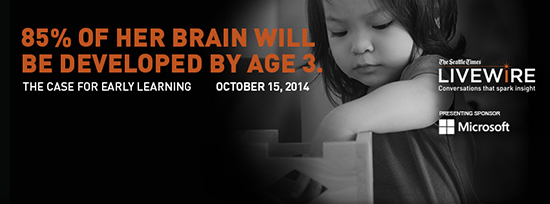A New York Times story describes research from I-LABS and others showing how it will take more than greater exposure to language to narrow the educational gap faced by children from low-income families. The White House held a summit Oct. 16 to talk about how to close the “word gap,” a disparity in which young children from low-income families hear … Read More
Video: Early Childhood Prime Time for Education, Researchers Say
At an event organized by the Seattle Times and Microsoft, Patricia Kuhl and Andrew Meltzoff, I-LABS co-directors, talked about how babies are born learning but their brains need the right inputs. Update Dec. 8, 2014: Watch the Seattle Times’ LiveWire event, “The Case for Early Learning,” on TVW. It will be broadcast Dec. 11, 2-4pm (channel information is online). Or watch it … Read More
Q&A on ‘The Case For Early Learning’
How do children learn from birth to age 3? Our experts weigh in on what science shows in brain development, what parents and caregivers can do to help young children be school ready, and characteristics of quality early learning programs. Patricia Kuhl and Andrew Meltzoff, co-directors of the University of Washington’s Institute for Learning & Brain Sciences, will give a presentation “Brain Science and … Read More
New York Times: Is E-Reading to Your Toddler Story Time or Screen Time?
Patricia Kuhl, I-LABS co-director, is quoted in a story about whether e-books and other digital media give the same developmental benefits for children. A front page story of the New York Times on Sunday, Oct. 12 opens with a question that’s on many parents’ minds: Does reading to your child on an e-book, iPad or other digital device count as … Read More
Infant, Control Thyself
The latest I-LABS research shows that toddlers who watch an argument use that emotional information to avoid making adults angry. The study, led by I-LABS’ Betty Repacholi and Andrew Meltzoff, shows that children as young as 15 months can detect anger when watching other people’s social interactions and then use that emotional information to guide their own behavior. “Through studying … Read More
How a Second Language Trains Your Brain
I-LABS researchers Andrea Stocco and Chantel Prat show that the brain’s basal ganglia may be a key player for bilinguals’ improved executive function. One of the recent neuroscience puzzles has been that people who are bilingual outperform monolinguals on cognitive tasks that have nothing to do with language. But it hasn’t been clear what happens in the brain to enable … Read More
What Makes Children Do Their Best?
The Seattle Times profiles Onnie Rogers, a postdoc at I-LABS. I-LABS postdoctoral fellow Leoandra “Onnie” Rogers is the first in her family to attend college, has a doctorate in developmental psychology, and will soon be inducted into UCLA’s Athletics Hall of Fame. Rogers works with I-LABS co-director Andrew Meltzoff. She’s interested in identity development among youth, and her research examines children’s … Read More
I-LABS Co-Directors Meet with Swedish Crown Princess
Andrew Meltzoff and Patricia Kuhl visited with the Crown Princess of Sweden, who has a baby girl. They talked about early learning and the brain. The meeting took place September 23 at the Royal Palace in Stockholm. While in Stockholm, Kuhl gave a lecture, “Early Learning and the Developing Child’s Brain,” at the Royal Swedish Academy of Sciences and will receive an honorary doctorate … Read More
King County Announces ‘Best Starts for Kids’ Initiative
Dow Constantine, King County Executive, will develop a levy proposal for early childhood and other youth services. Constantine said he will work with community partners and other advisers to develop an initiative “Best Starts for Kids,” which he announced Sept. 22 as part of his budget plan for 2015 and 2016. The initiative’s website cites social, health and economic research findings from … Read More
Lessons on Learning From Inside Children’s Brains
The Seattle Times talks with I-LABS co-director Patricia Kuhl and other UW researchers who are studying brain development and literacy skills in children. The front page of the Monday, Sept. 22 Seattle Times features a story on UW research on what happens in the brain as children learn to speak, listen, read and write. The story is part of an education series … Read More







